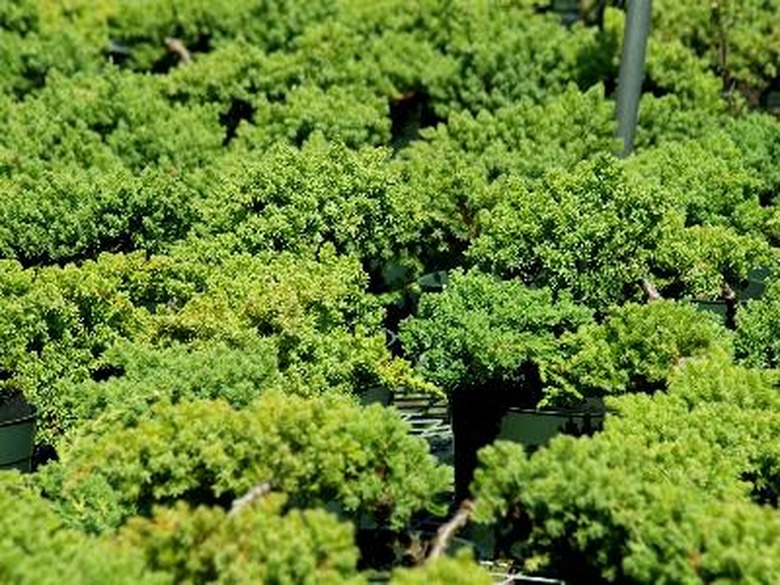Low Growing Junipers
Junipers are trees and shrubs of the Juniperus genus. About 50 species of juniper exist, all bearing fleshy cones with hard-shelled seeds and aromatic, needle-like, bluish evergreen foliage. Birds distribute juniper seeds; they have carried them throughout the world.
Junipers are trees and shrubs of the Juniperus genus. About 50 species of juniper exist, all bearing fleshy cones with hard-shelled seeds and aromatic, needle-like, bluish evergreen foliage. Birds distribute juniper seeds; they have carried them throughout the world. Although many junipers, including the well-known common juniper (Juniperus communis), grow in the form of trees, there are several species that exhibit a low shrub-like growth habit. Gardeners use low-growing junipers in landscaping as border shrubs or evergreen ground covers.
Creeping Juniper
One low-growing juniper species popular with gardeners is creeping juniper (Juniperus horizontalis), also known as creeping cedar or trailing juniper. The dark foliage of this hardy, ground-hugging shrub is notably soft and fine-textured. Creeping juniper is available in around 60 cultivated varieties. Some, such as Plumosa, reach heights of 2 feet, while varieties such as Blue Rug rarely ascend to heights exceeding 6 inches.
- Junipers are trees and shrubs of the Juniperus genus.
- Although many junipers, including the well-known common juniper (Juniperus communis), grow in the form of trees, there are several species that exhibit a low shrub-like growth habit.
Native to Alaska, Canada and the northern United States, creeping juniper is accustomed to dry, cold, rocky conditions. This plant prefers full sun and tolerates drought once established. Creeping juniper is hardy in U.S. Department of Agriculture Growing Zones 3 to 10, and flourishes at elevations up to 8,000 feet above sea level.
Japanese Garden Juniper
Another prevalent species of low-growing juniper is Japanese garden juniper (Juniperus procumbens). Japanese garden juniper grows in a low, spreading pattern and bears silvery, light green needles. Indigenous to Japan, this elegant shrub is commonly used to make. Some varieties of this juniper can grow up to 2 feet tall. The popular Nana cultivar typically attains a mature height of 1 foot or less.
- Native to Alaska, Canada and the northern United States, creeping juniper is accustomed to dry, cold, rocky conditions.
- The popular Nana cultivar typically attains a mature height of 1 foot or less.
Japanese garden juniper is hardy in growing zones 4 to 8. Like creeping juniper, it enjoys full sun. This shrub is adaptable to many soil conditions, and is easily transplanted.
Singleseed Juniper
Singleseed juniper (Juniperus squamata), also known as flaky juniper, is a species of juniper that has several varieties well suited to forming low shrubs and ground covers. The Blue Carpet cultivar in particular, reaching heights of under a foot, is known for its spreading habit and alluring foliage. This foliage is silvery-blue in color and feathery in texture.
Endemic to the mountainous regions of Afghanistan and western China, singleseed juniper is hardy in growing zones 4 to 8. This singular shrub thrives in either full sun or partial shade, and is easily propagated from cuttings. It requires well-drained soil, and can survive periods of drought once established.
- Japanese garden juniper is hardy in growing zones 4 to 8.
- This shrub is adaptable to many soil conditions, and is easily transplanted.
Savin Juniper
Savin juniper (Juniperus savina) is a low-growing juniper native to Europe and portions of western Asia. This adaptable shrub is hardy to growing zone 3. Its bright blue-green foliage is fern-like and scaly.
Savin juniper prefers moist, well-drained soil and full sun. It is easy to transplant and requires minimal maintenance. Popular ground cover varieties include Buffalo, with an impressive 8-foot spread and 12-inch height, and Arcadia, with a 5-foot spread and 18-inch height.
